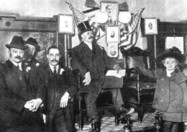Back in the 1970s a Harvard-trained professor named Gilbert Cuthbertson taught the introductory poli sci course at Rice University.
I took it as a freshman. The first book we read was the classic Plunkitt of Tammany Hall. There were 15 books in all, and we devoured them ravenously.
What "Doc C" taught was that politics can be explained easily by a simple equation consisting of three variables — Myth, Power and Value:
- Myth is the story people understand of how their state or nation got to be what it is, and where it’s going. It may be true, it may be false, it is usually a mixture of the two.
- Power is the aim of politics, the ability to control what the state does.
- Value means lessons, assumptions of what is true. These days we call this values.
The general equation is M x V = P, or Myth times value equals power. This also lets you solve for M and V.
From this, eventually, emerged my own theories on American politics.
It combines Doc C’s analysis with that of many mainstream thinkers such
as Daniel Elazar, who talk of a generational theory in American politics.
Each generation faces a crisis that creates Myths, and defines Values, which determine Power relationships. After the initial crisis,
young people are taught these myths, and the resulting political Thesis
builds until it faces a crisis for which its myth has no answer.
It’s during such a crisis that the President and political
leadership may appear to be stupid, or ignorant, or seemingly struck
dumb by events that are spinning out of control. But out of this crisis
emerges a new myth, a new set of values, and a new generational
equillibrium.
In my own work, I have divided each generation into specific parts:
- The Crisis period, where the myth is defined.
- The Validation period, where the myth is sustained and proven.
- The Anti-Thesis period, where the opposition takes power with a story that leans against the existing myth, and depends upon it.
- The Excess period where the myth becomes counter-productive, yet is believed in more than ever.
Based on my initial, primitive intuiting of all this, I guessed that

my whole heart. What I failed to understand is the impact of longer
lifespans on political generations. Because we live longer, and are
vital longer, the knees jerked on schedule — swiftboating only works
if you’re ready to be swiftboated.
All this means there is an even
greater disconnect between our political assumptions — the myths and
values we bring to the voting booth — and the reality of our time. As
the coming environmental crisis approaches us no one has the vocabulary
for dealing with it politically.
I have spent much of the last year, here, searching for a new Myth, and
new Values, through which people might exercise Power and face the
coming crisis. The result of that is the Open Source Thesis, or what
you might call an Internet Thesis. It’s the values that move this
medium forward — openness, consensus, and connectivity chief among
them — that can best address the looming crisis.
And so here we are.












